
The Criminalization of Denialism: A Slippery Slope
On September 26, 2024, a New Democratic Party (NDP) Member of Parliament, Leah Gazan, tabled a bill that would criminalize the downplaying or denial of the Indian residential school system in Canada. During a House of Commons Debate on October 3, 2024, Leah Gazan called for the federal government to support her bill, claiming that survivors have a “right to be protected from hate speech.” In the same debate, a colleague of Gazan, Minister Gary Anandasangaree, pledged support for the bill which he reaffirmed would “recognize residential school denialism as a hate crime.” The criminalization of denialism is invariably woven into the crusade against hate speech, which plays into the greater war to regulate thoughts and words deemed unacceptable by the ruling forces that be.
While a bill calling to criminalize residential school denialism may appear to have come out of the blue, it has on the contrary been built on the back of Holocaust denialism, which many parts of the world have already criminalized. One of the places where the criminalization of Holocaust denialism has become normalized is Canada, where denying or downplaying the Holocaust can lead to imprisonment. Before the introduction of Gazan’s bill, special interlocutor, Kimberly Murray, said that they were “waiting” for a bill that criminalizes residential school denialism, arguing that one way to go about criminalizing it was to amend the Criminal Code, citing the way the federal government had gone about criminalizing Holocaust denialism. Advocates such as Kimberly Murray and Eleanore Sunchild, a Cree lawyer who has argued that residential school denialism is equivalent to Holocaust denialism, showcase how the legality of Holocaust denialism has set a precedent for today’s calls to criminalize people who downplay or deny the reality and history of residential schools.
America’s 1st amendment has made the country largely immune to the speech laws spreading throughout the west. Given the constitutional guardrails, however, governments within America have opted instead to pressure and collude with social media companies to censor content that falls under the umbrella of denialism. In 2020, Meta (formally Facebook) explicitly banned Holocaust denialism, prohibiting “any content that denies or distorts the Holocaust.” The way that social media companies prohibited content that downplayed or denied the severity or existence of COVID-19 also demonstrates not only the slippery slope of criminalizing denialism, but the absurdity of policing what people are allowed to believe in – or not believe. This slippery slope has even already expanded into punishing, as a social media policy and as a hate crime in Canada, the denial or questioning of transgenderism. Considering the tendency for social media companies to adopt government speech laws into their platform policies, whether by force or choice, it is likely only a matter of time before downplaying or even questioning residential schools, as they existed both in America and Canada, becomes another form of hateful speech.
If we want to protect free speech and prevent the expansion of speech laws, we must reckon with not only the concept of hate or offensive speech but also the legal precedent that Holocaust denialism has set in motion. Ultimately, it should not be forbidden to speak and express thoughts that may be unpopular or offensive, and the government ought to not be in the business of prohibiting opinions that they dislike. It becomes more glaringly obvious, as more speech laws are introduced, that the war on hate speech is a never-ending slippery slope with the criminalization of denialism being but one dystopian manifestation of it. What started with criminalizing Holocaust denialism has evidently moved into questioning the history of residential schools. Although the trajectory of what follows is unknown, certainly governments will not relinquish their capacity to legally compel citizens into adopting State-approved beliefs.

Aviel Oppenheim is a writer and novelist with two independently published books under his name, which include the Ethics of Vaccine Passports: A Poor Bargain and his debut fiction novel, Abiden. He is also a senior editor at Materia+ and a contributor at Dissident Media.

Leave a Reply